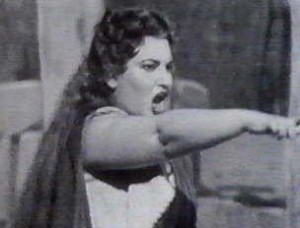By Albert Innaurato.
December the second was the 90th birthday of poor Maria Callas. The encomiums of hysterics appeared on the opera lists; there was even a doodle on Google. Isn’t that a thrill?
Like Placido Domingo, who lately cracked on a high note while trying to sing the Verdi baritone role of The Count di Luna in Il Trovatore, Callas has become a commodity. Domingo played “Let’s help the hype” by telling Anna Netrebko that she was “like Callas”. So Callas has become a decorative robe and essentially meaningless. Netrebko had the savvy to demur. Whatever she has or doesn’t have to offer she knows she’s not Callas. And since Callas had a very tough and finally, a very sad life, who would want to be?
In all the Internet commentary that followed the crack and the comparison, only a few mentioned that Domingo is not a baritone, he’s an older tenor, period. Not everyone thinks he was great or even very good. People have made up their own minds about that, since he still sells tickets. But if one judges by resonance and sonority he remains a tenor. On Netrebko’s recent CD devoted to Verdi arias, a score follower would have to notice musical compromises that Callas could hardly have conceived of, let alone have been willing to put on something as durable as a CD. But again, let those who love Madame Netrebko buy their tickets and scream themselves hoarse for what she can actually do. It should not be that the only real world use of Callas is to promote someone else, from a very different background and of a very different generation, with their own hurdles to clear. Callas deserves more than to be used as a bandwagon. I know many are happy to see her exploited that way. I doubt the ghost of Maria Callas is.
That poor woman when asked in her last years how things were, would reply, “one day less!” She ended up miserable and alone. She was 54; her voice had collapsed ten years earlier and she had sung with reduced volume, range and control for four years before that. She had, a few years before her death, made money touring the world, sort of Sunset Boulevard meets The Marx Brothers with the then broke tenor, her once famous colleague, Giuseppe Di Stefano. One hopes she knew it was a joke but perhaps she didn’t. She needed an infusion of cash, too. Her widely reported affair with Aristotle Onassis gave people the wrong impression of her finances. Onassis’ sudden marriage to The Widow Kennedy hoping for her in- laws’ influence in his American businesses and the ensuing stresses, kept Callas before the public as the cast off of a billionaire. Only Mrs. Kennedy won in this strange interlude. But Callas became a tabloid floozy instead of the great artist she had aspired to be, and for a time, was.
Sadly, she had bought into her myth. Privately, she continued to work on her voice; a few late fragments on tape even sound like her. Could she perhaps have mastered part of the huge song repertory as the great Victoria de los Angeles did when her opera career ended early? But as Callas thought of herself as a diva, that was beneath her. She did try two sets of master classes and found the students poorly prepared and not stimulating. Her reward was an internationally successful play by Terrance McNally. Many thought it was true to Callas, though the complete tapes of her Julliard master classes, some of which I saw, show a very different person: shy, correct and helpful. The brassy, bitchy, sex obsessed fictional character raises at least the question of misogyny. We live however in a society where pretty much everything has been defined down, and the notion of il sacro fuoco — the sacred fire — that Callas embraced, is now a joke. Maybe she is too.
How could she have come to that? We all die, some of us are young when the heart stops; all artists know that a career is a tight rope walk over an abyss likelier at the end to hold poverty and obscurity than worshipful remembrance. Callas escaped the obscurity but it would be better were she remembered for a kind of genius in some roles, Norma, Anna Bolena, oddly enough the despised La gioconda — her second recording, made when her voice was failing is an amazing, perhaps unique, example of spinning pathos out of dross — than as a tired name snatched at by every opportunist to glorify qualities she conspicuously lacked: laziness, coarseness, musical ineptitude.
Yes, opera as Callas dreamed it and as it sometimes really was, is dying out. But don’t worry. Despite common belief, the dinosaurs lasted at least tens of thousands of years gasping and roaring after what is thought to have been a comet wiped most of them out.
